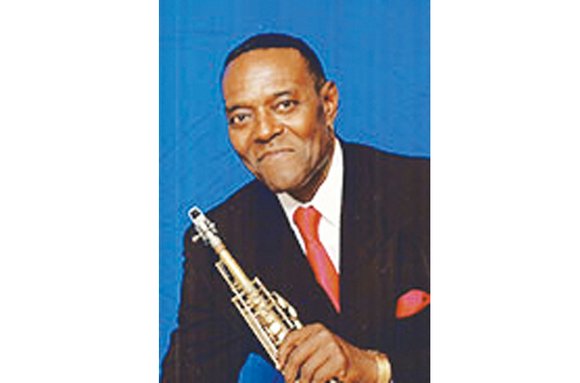Richmond’s Plunky Branch releases autobiography at June 23 event
6/10/2016, 6:57 a.m.
By Malik Russell
James “Plunky” Branch’s music consistently contains elements of jazz, funk and soul linked with African concepts of “Juju” and “oneness.”
Such sounds, which echo the title of his new autobiography, “PLUNKY — JuJu Jazz Funk & Oneness,” reflect a “positive force” for the music that has shaped his life.
Mr. Branch will perform and answer questions during a book launch at 5:30 p.m. Thursday, June 23, at the Library of Virginia, 800 E. Broad St., in Downtown.
The program is free, but registration is required.
Mr. Branch, who was one of the founders of the Richmond Jazz Society, was honored by Dominion and the Library of Virginia in the Strong Men and Women in Virginia History series in 2015.
“Juju for me refers to everything African, jazz is the art music of the early 20th century and funk is the gritty urban music in the second half of the 20th century,” the internationally known saxophonist and Richmond native said in a recent Free Press interview. “Oneness is where I hope the music is going in the 21st century.”
For more than 40 years, Mr. Branch and his various incarnations of JuJu and Oneness have been a positive force in Richmond and beyond.
Under the names “Oneness of Juju,” “Plunky and Oneness of JuJu” and “Plunky & Oneness,” he has released 25 albums through his independent label, N.A.M.E. Brand Records. The song, “Every Way But Loose,” made the Top 10 on London’s soul music chart in 1982.
He has opened for such luminaries as Patti LaBelle, Ray Charles, Earth Wind & Fire, the Yellowjackets, Frankie Beverly and Maze, LL Cool J, and Chuck Brown.
Mr. Branch said he uses juju in his music to empower people, particularly those of African descent, to help them understand their own power in their struggles against oppression.
While his book chronicles his musical and spiritual journey, Mr. Branch hopes that it will benefit current and future musicians.
“The biggest purpose of the book is to share my experience with the intent that other people coming behind me will get some (insight on) best practices of what worked for me,” he said.
“The book is an attempt to mentor to younger musicians by sharing what I’ve done.”
Mr. Branch’s foray into intercultural music began when he was a student at Columbia University in New York. There he became involved with the antiwar protests and Black Power movements of the 1960s.
“I was involved in the concept of nationalism, the concept of elevating black life and black culture to what we believed was its rightful position of at least equality to any other culture,” Mr. Branch said.
The experience made him realize there was more than one way to empower people, and music was to become his weapon of choice.
“It (protest) wasn’t the only way to get that information out and it wasn’t the only way to affect behavioral change,” Mr. Branch said. He believed that music could be a subtle reminder of “our power, a subtle reminder of what we wanted to achieve in terms of societal change.”
After Columbia, Mr. Branch went to San Francisco, where he studied African music under Ndikho Xaba, a South African musician and performer in exile from apartheid in his homeland.
The experience became Mr. Branch’s impetus to form the band “JuJu,” which focused on African drumming, African spirituality and culture.
The band’s first album was “Juju — A Message From Mozambique” in 1973.
In New York, Mr. Branch and his band tapped into the local music scene, where they worked with musicians such as Sam Rivers, Frank Lowe, Rashied Ali, Pharoah Sanders, Sun Ra, Clifford Jordan, Sonny Fortune and Jackie McLean. Jazz great Ornette Coleman allowed them to live and work out of his studio in SoHo, Mr. Branch recalls.
In 1974, after the release of “Juju Chapter Two: Nia,” the band moved to Richmond.
Through the years, his music has become as layered as his experience, incorporating hip- hop, smooth jazz, reggae, samba and classical. He has traveled throughout Europe, Africa, Asia and South America.
Two years ago Mr. Branch worked with his son, J. “Fire” Branch, to release the “Never Too Late” album, in which some of Mr. Branch’s older soul and jazz songs are remixed with hip-hop sounds.
Earlier this year, he released a jazz rendition of The Whispers’ tune, “In the Mood.”








